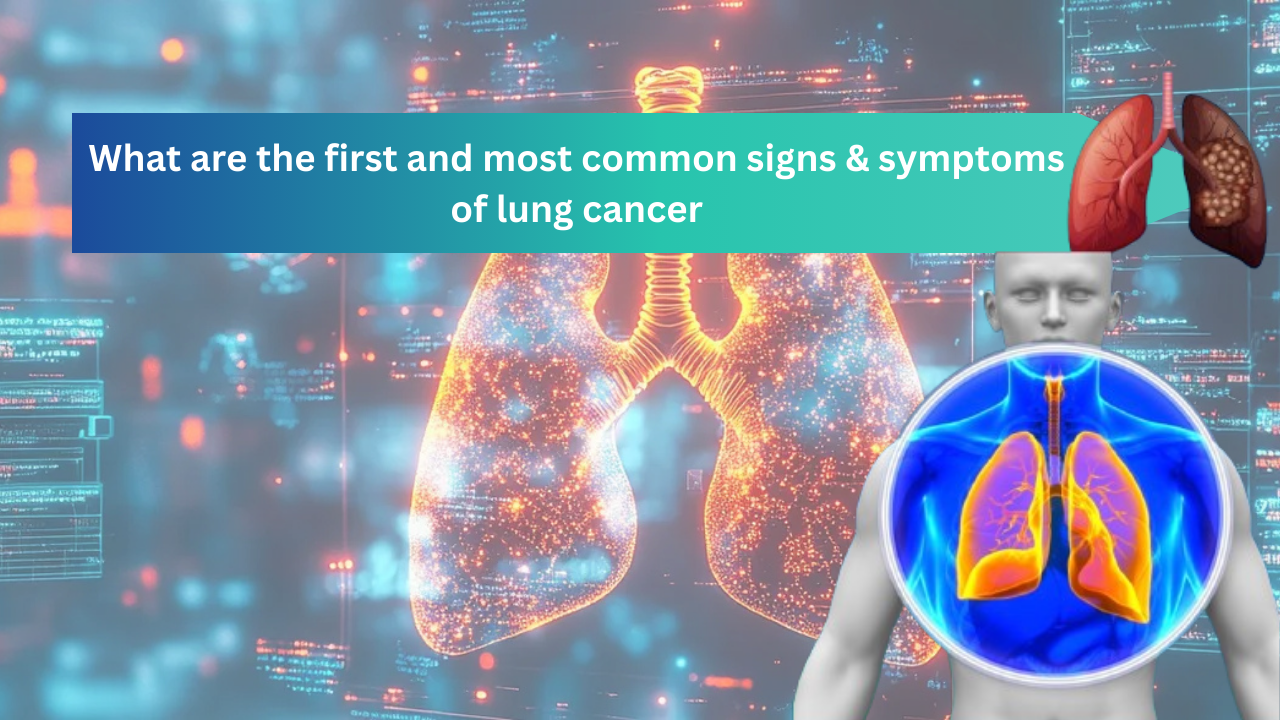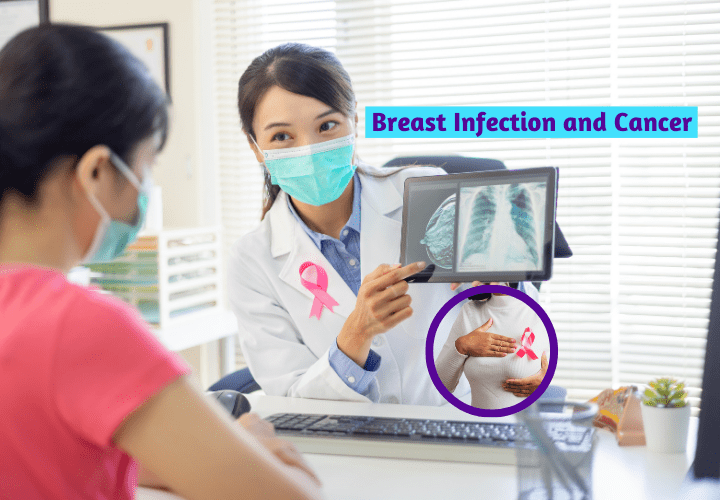What Are the First and Most Common Signs & Symptoms of Lung Cancer?

What Are the First and Most Common Signs & Symptoms of Lung Cancer?
- onco
- December 17, 2024
One of the most prevalent cancers in the world and a major contributor to cancer-related mortality is lung cancer. Identifying in its early stages might be challenging because it frequently manifests without overt symptoms. However, by enabling earlier detection and lung cancer treatment, knowledge of the early warning signs and symptoms of lung cancer can greatly improve results. To assist you in knowing what to watch out for and when to get medical treatment, we will go over the first and most typical signs and symptoms of lung cancer in this blog post. So, let’s start!
About Lung Cancer –
When aberrant cells in the lungs start to grow out of control and create tumours that can obstruct the lungs’ normal function, lung cancer results. Lung cancer comes in two primary varieties:
- About 85% of all instances of lung cancer are Non-Small Cell Lung Cancer (NSCLC), making it the most prevalent kind.
- Despite being less frequent, small cell lung cancer (SCLCtendscy) grows and spreads more quickly than non-small cell lung cancer (NSCLC).
Because early-stage symptoms are either nonexistent or very faint, lung cancer is frequently discovered in its later stages. However, being aware of the early warning indicators can assist in detecting the illness sooner, which could significantly impact survival and treatment like chemotherapy.
The Initial Indications of Lung Cancer
Some people may start to notice minor changes in their health, even though the early stages of lung cancer may not have any obvious symptoms. Early detection of these alterations is essential for timely diagnosis and care. The following are some of the earliest and most typical indicators to watch out for:
- A chronic cough –
One of the most prevalent early signs of lung cancer is a chronic cough. Over time, it may begin as a mild, sporadic cough but progressively increase in frequency and persistence. Other symptoms, such as chest pain or blood in the cough, may accompany this cough as it gets worse. A persistent cough may be attributed to an underlying lung illness, such as asthma or chronic bronchitis, but if it does not go away or gets worse, a healthcare professional should be consulted.
- Pain in the chest –
Chest discomfort can be an early sign of lung cancer, especially if it is persistent or worsens when you cough, laugh, or breathe deeply. A single spot on the chest may be the source of the pain, or it may be more widespread and spread to the shoulders, back, or upper abdomen. A tumour pressing on adjacent chest structures, such as the ribs, muscles, or nerves, may cause chest pain. In rare instances, it may also happen if the tumour extends to the pleura, the lining of the chest or lungs, resulting in inflammation and discomfort.
- Breathing difficulties –
Even with little exertion, shortness of breath or an increased tendency to get winded could be an early warning sign of lung cancer. Airflow into and out of the lungs can be hampered by tumours that block or compress airways. Breathlessness may result from this, even when walking or climbing stairs or other daily activities.
- Hemoptysis, or coughing up blood –
Coughing up blood, or hemoptysis, is a worrying sign that people with lung cancer may experience. The blood might range in severity and appear in mucus as clots or streaks. Coughing up blood is a warning sign for lung cancer, but other illnesses, including respiratory infections or chronic bronchitis, can also bring it on. It’s critical to get medical help immediately if you encounter this symptom.
- The wheezing –
A high-pitched whistling sound produced during breathing, especially during exhalation, is known as wheezing. It can happen when a tumour blocks or partially obstructs the airway and is frequently caused by restricted airways. Wheezing should not be disregarded in the context of lung cancer, even though it can also be an indication of other respiratory disorders such as pneumonia or asthma.
Other Symptoms to Look Out for –
As the disease worsens, lung cancer can cause several other symptoms in addition to the early warning indicators listed above. These could consist of:
- Exhaustion –
Lung cancer is among the various tumours that frequently cause fatigue. The body’s reaction to the tumour or the physical toll the illness takes on the body may cause an overpowering feeling of weakness or exhaustion. Even after resting, people with lung cancer may experience persistent weariness and struggle to perform everyday tasks.
- Inexplicable Loss of Weight –
Lung cancer may also be indicated by unexplained weight loss. This symptom may be brought on by the cancer’s increased energy demands on the body, as well as by malnutrition and appetite loss. A health care provider should be consulted if someone loses considerable weight (more than 5–10% of body weight) without attempting.
- Hoarseness or Vocal Changes –
Vocal abnormalities may result from lung cancer, especially from tumours close to the larynx or vocal cords. When the tumour disrupts normal vocal cord function, it may result in a harsh or raspy voice or the inability to talk at normal volumes. A trip to the doctor for additional assessment is necessary if hoarseness lasts more than a few weeks.
- Inflammation of the Face or Neck –
Swelling in the face, neck, or upper chest may be a symptom of lung cancer, particularly if the tumour presses against veins that return blood to the heart. When a tumour blocks the superior vena cava, a big vein that returns blood from the head, neck, and arms to the heart, it can cause superior vena cava syndrome, which is linked to this symptom. Usually, other symptoms like coughing or trouble breathing accompany facial and neck swelling.
- Headaches or Bone Pain –
Lung cancer can cause bone pain, particularly in the ribs, spine, or hips, if it metastasizes or spreads to other parts of the body. If the cancer spreads to the brain, headaches may also result. Although it’s essential to be aware of these symptoms, they frequently manifest in the latter stages of lung cancer.
When should we see a Doctor?
Since many of the symptoms listed above might be caused by other, less serious disorders, noticing any of them does not always suggest you have lung cancer. It’s crucial to get medical help, though, if the symptoms worsen over time or continue. Because it can greatly improve the likelihood of a successful course of therapy, early identification of lung cancer is essential.
Because early symptoms of lung cancer can be hazy or nonexistent, the disease is frequently discovered at a later stage. Early diagnosis and a higher probability of successful treatment can be achieved by recognizing the initial and most typical symptoms, which include a persistent cough, chest pain, shortness of breath, and coughing up blood. You must get medical help right away if you or someone you know is exhibiting any of these symptoms. Even though lung cancer is still a complex condition to cure, results are getting better thanks to continuous improvements in prevention, detection, and therapy. Early detection is crucial for lung cancer survival, so it’s essential to pay close attention to your health, particularly if you’re addicted to smoking or other factors that can put you at higher risk. So, to detect such cases early, you should consult with the finest cancer hospital in Delhi, like Oncoplus. Fighting this disease can be significantly aided by routine screenings and examinations, especially for high-risk individuals. At Oncoplus, we work with India’s social security schemes to build a vision of a cancer-free and cancer-informed India. So, feel free to reach out to us, as we have a scope of services that are invented to provide holistic treatment and diagnostic platforms.
Recent Posts
-
Pap Smear Screening for Cervical Cancer: Everything You Need to Know
February 26, 2025





Leave a Reply